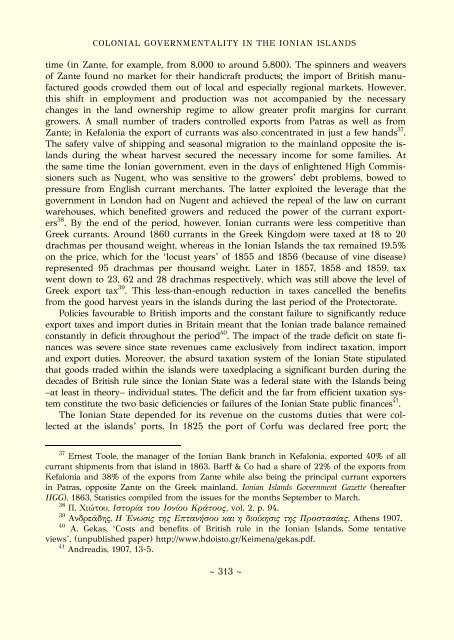Create successful ePaper yourself
Turn your PDF publications into a flip-book with our unique Google optimized e-Paper software.
COLONIAL GOVERNMENTALITY IN THE IONIAN ISLANDS<br />
time (in Zante, for example, from 8,000 to around 5,800). The spinners and weavers<br />
of Zante found no market for their handicraft products; the import of British manufactured<br />
goods crowded them out of local and especially regional markets. However,<br />
this shift in employment and production was not accompanied by the necessary<br />
changes in the land ownership regime to allow greater profit margins for currant<br />
growers. A small number of traders controlled exports from Patras as well as from<br />
Zante; in Kefalonia the export of currants was also concentrated in just a few hands 37 .<br />
The safety valve of shipping and seasonal migration to the mainland opposite the islands<br />
during the wheat harvest secured the necessary income for some families. At<br />
the same time the Ionian government, even in the days of enlightened High Commissioners<br />
such as Nugent, who was sensitive to the growers’ debt problems, bowed to<br />
pressure from English currant merchants. The latter exploited the leverage that the<br />
government in London had on Nugent and achieved the repeal of the law on currant<br />
warehouses, which benefited growers and reduced the power of the currant exporters<br />
38 . By the end of the period, however, Ionian currants were less competitive than<br />
Greek currants. Around 1860 currants in the Greek Kingdom were taxed at 18 to 20<br />
drachmas per thousand weight, whereas in the Ionian Islands the tax remained 19.5%<br />
on the price, which for the ‘locust years’ of 1855 and 1856 (because of vine disease)<br />
represented 95 drachmas per thousand weight. Later in 1857, 1858 and 1859, tax<br />
went down to 23, 62 and 28 drachmas respectively, which was still above the level of<br />
Greek export tax 39 . This less-than-enough reduction in taxes cancelled the benefits<br />
from the good harvest years in the islands during the last period of the Protectorate.<br />
Policies favourable to British imports and the constant failure to significantly reduce<br />
export taxes and import duties in Britain meant that the Ionian trade balance remained<br />
constantly in deficit throughout the period 40 . The impact of the trade deficit on state finances<br />
was severe since state revenues came exclusively from indirect taxation, import<br />
and export duties. Moreover, the absurd taxation system of the Ionian State stipulated<br />
that goods traded within the islands were taxedplacing a significant burden during the<br />
decades of British rule since the Ionian State was a federal state with the Islands being<br />
–at least in theory– individual states. The deficit and the far from efficient taxation system<br />
constitute the two basic deficiencies or failures of the Ionian State public finances 41 .<br />
The Ionian State depended for its revenue on the customs duties that were collected<br />
at the islands’ ports. In 1825 the port of Corfu was declared free port; the<br />
37 Ernest Toole, the manager of the Ionian Bank branch in Kefalonia, exported 40% of all<br />
currant shipments from that island in 1863. Barff & Co had a share of 22% of the exports from<br />
Kefalonia and 38% of the exports from Zante while also being the principal currant exporters<br />
in Patras, opposite Zante on the Greek mainland. Ionian Islands Government Gazette (hereafter<br />
IIGG), 1863, Statistics compiled from the issues for the months September to March.<br />
38 Π. Χιώτου, Ιστορία του Ιονίου Κράτους, vol. 2, p. 94.<br />
39 Ανδρεάδης, Η Ένωσις της Επτανήσου και η διοίκησις της Προστασίας, Athens 1907.<br />
40 A. Gekas, ‘Costs and benefits of British rule in the Ionian Islands. Some tentative<br />
views’, (unpublished paper) http://www.hdoisto.gr/Keimena/gekas.<strong>pdf</strong>.<br />
41 Andreadis, 1907, 13-5.<br />
~ 313 ~



